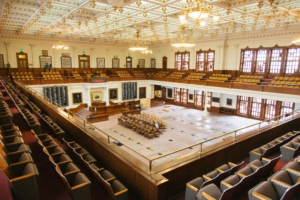3 Reasons Why Foreign Aid Matters to the UK’s Soft Power
 The U.K. currently ranks third in the 2021 Global Soft Power Index, but analysts argue that recent cuts to its foreign aid budget threaten to undermine its position. So what are these cuts? Could they really weaken the U.K.’s soft power? Is soft power even that useful?
The U.K. currently ranks third in the 2021 Global Soft Power Index, but analysts argue that recent cuts to its foreign aid budget threaten to undermine its position. So what are these cuts? Could they really weaken the U.K.’s soft power? Is soft power even that useful?
Since 2020, the U.K. has spent only 0.5% of its gross national income on foreign aid, as opposed to 0.7% – the U.K.’s usual level of historic foreign aid expenditure and the U.N.’s recommended amount.
Moreover, in the last week of March, the U.K.’s government suggested that they would cut their foreign development budget next year by £1.5 billion, making it the second year in a row that their foreign aid budget will be 20% lower than expected.
The U.K. set aside a third of its aid budget to deal with the soaring costs associated with housing refugees inside the country. A spokesperson for the OECD’s Development Assistance Committee said, “These rising costs are due to a “dramatic increase in expenditure on initial accommodations.”
The knock-on effect these added asylum costs has on a shrinking foreign aid budget not only matters to recipient countries but to the U.K. itself. The House of Commons International Development Committee said in a report, “U.K. aid extends the U.K.’s influence on the international stage, creating soft power.”
There are three reasons that better explain why foreign aid matters to the U.K.’s soft power.
Improved Reputation
In 2020, the Foreign Policy Centre spoke of the “communities around the world, who see the food, tents and other supplies that we distribute proudly marked with the Union Jack.”
This has a positive effect. The British Council’s Value of Trust report, polling more than 19,000 people around the world, found that the “perception of the U.K. as a contributor of overseas development aid was the biggest factor driving trust in the U.K. Government.”
On the other hand, the British think tank, Chatham House, claimed that stopping projects prematurely (including those providing reproductive health assistance to women), due to U.K. aid budget cuts, had a severely negative effect on Britain’s reputation.
In short, there is a need for sufficient foreign aid investment to ensure poverty-busting British programs see a successful conclusion, and to ensure that the U.K.’s standing on the world stage does not diminish.
Strengthened Diplomacy
Chatham House has also called foreign aid a “key tool in the ambassadorial toolbox.” Yen Ming-Hong, a former Director at the Taiwan International Cooperation and Development Fund echoed this. He said that in the 1960s when Taiwan was no longer represented in the U.N., the country tried to keep alliances with the African continent by providing “agricultural assistance in the hope that we can have their diplomatic support.”
In essence, this suggests that offering developing countries support through aid improves diplomatic relationships. Moreover, investing in aid through organizations like the U.N. could help the U.K. remain “at the table” in times of key decision-making within such an influential institution.
Deepened Academic Ties
Foreign aid from the U.K. is intrinsically linked to science and research. For example, according to the Director of the Institute of Development Studies, Melissa Leach, when it came to Ebola outbreaks in Uganda, British epidemiologists worked with Ugandan social scientists to come up with effective strategies and ideas to help contain Ebola amongst networks of friends and family.
As a U.K. policy paper recognizes, these sorts of joint academic exercises can “expand the U.K.’s network of Tech Envoys” and help “build our diplomatic network.” In other words, building scientific bridges could be a boost to the U.K.’s soft power.
So, while it is clear that a robust aid budget, set aside for foreign programs, plays a part in bolstering the U.K.’s soft power, it is also evident its soft power provides real social and economic benefits.
After World War II, South Korea, for example, received large amounts of U.K. foreign aid. Because of the diplomatic relationships and soft power that this aid effort leveraged, the U.K. built strong trade ties with South Korea. In 2018 alone, trade between the two countries was worth £14.6 billion, making it one of the U.K.’s most important partners in East Asia.
Looking Ahead
It could be to the U.K.’s benefit, then, that the country’s Treasury has announced that there should be a return to a 0.7% aid budget by 2026-2027. This may not only be a big boost to the U.K.’s soft power, but it could also strengthen the country’s economic position.
– Sam Rucker
Photo: Unsplash
